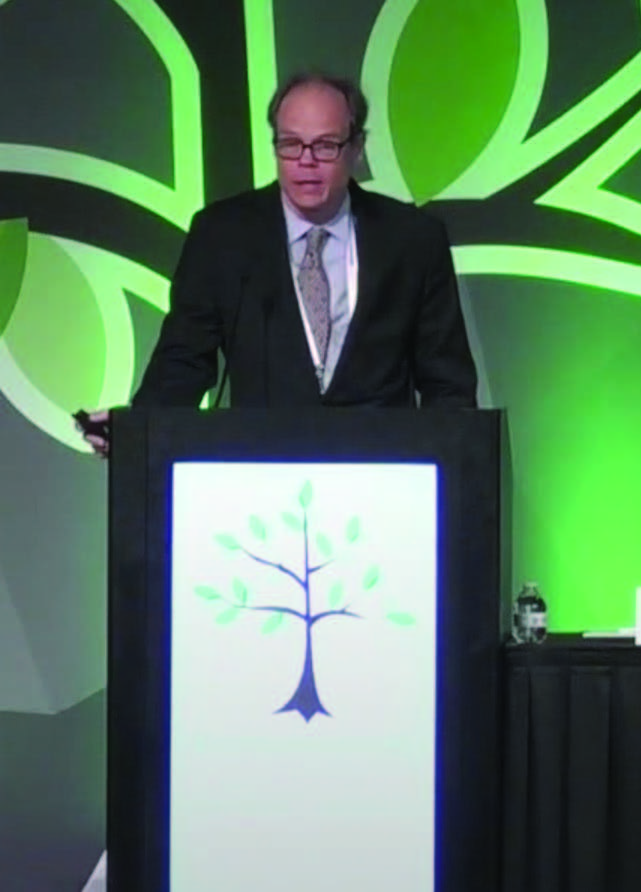
Tim F. Greten, MD.
Over the years, the therapeutic landscape for cholangiocarcinoma (CCA) has expanded beyond chemotherapy to include immunotherapy and targeted therapies as part of an individualized approach to treatment.1 At the 10th Annual Cholangiocarcinoma Foundation Conference, Tim F. Greten, MD, Deputy Chief, Thoracic and GI Malignancies Branch; Head, Gastrointestinal Malignancy Section; and Co-Director, National Cancer Institute Center for Cancer Research Liver Cancer Program, Bethesda, MD, discussed novel targets for future CCA treatments coming from translational research studies.
Dr Greten first discussed pharmacologic inhibition of cancer-associated fibroblasts (CAFs) as a therapeutic target. CAFs promote progression of intrahepatic CCA, and eliminating them in mouse models resulted in fewer tumors, demonstrating a novel target independent of the tumor itself.2 He also discussed tumor cell metabolism as a potential drug target because metabolic reprogramming is a well-known characteristic of cancer and allows the tumor cells to meet the increased energy demand of proliferation and metastasis.3 In CCA, altered glucose, lipid, and amino acid metabolism can be targeted because these processes are different in tumors compared with healthy tissue, and many potential drug targets are evident throughout the metabolic processes.3
Novel molecular targets are also being studied as a therapeutic strategy in CCA. EGFR is a target of growing interest, and it has been shown that EGFR inhibition potentiates FGFR inhibitor therapy and can potentially overcome resistance in FGFR2 fusion–positive CCA.4
Finally, novel immune targets continue to be studied in CCA, including unique therapeutic strategies such as chimeric antigen receptor T cells, bispecific antibodies, agonistic checkpoint antibodies, and innovative combination strategies. Various combinations of anti-CTL4, anti–PD-L1, and anti-VEGF therapies have been studied, although responses have been minimal. One study in 6 patients with CCA demonstrated increased survival with a triplet combination of these 3 therapies; however, there were unexpected toxicities that are typically infrequent in patients.1,5 Because of the efficacy demonstrated in the 6 patients, researchers returned to mouse models to further investigate this therapeutic strategy. They found that there is significant toxicity with the triplet combination therapy, and mouse models demonstrated inflammation in lung, kidney, and liver tissue; however, there continues to be demonstrated efficacy over doublet combination strategies that needs further investigation.1
Anti-CD40 is another potential immune target. The combination of anti–PD-1/CD40 plus gemcitabine/cisplatin demonstrated efficacy in mouse models and is now being studied in a phase 2 trial of pembrolizumab (Keytruda) and CDX-1140 in combination with capecitabine (Xeloda) and oxaliplatin (Eloxatin) in patients with advanced biliary tract cancer.6
References
- Greten TF. Novel targets for the future; what is coming from basic research? Presented at: Cholangiocarcinoma Foundation meeting, April 12-14, 2023; Salt Lake City, UT.
- Affo S, Nair A, Brundu F, et al. Promotion of cholangiocarcinoma growth by diverse cancer-associated fibroblast subpopulations. Cancer Cell. 2021;39:866-882.e11. Erratum in: Cancer Cell. 2021;39:883.
- Raggi C, Taddei ML, Rae C, et al. Metabolic reprogramming in cholangiocarcinoma. J Hepatol. 2022;77:849-864.
- Wu Q, Zhen Y, Shi L, et al. EGFR inhibition potentiates FGFR inhibitor therapy and overcomes resistance in FGFR2 fusion–positive cholangiocarcinoma. Cancer Discov. 2022;12:1378-1395.
- Benmebarek R, Greten T, Monge C, et al. Combined anti-VEGF, anti-CTLA4 and anti-PDL1 treatment induces strong immune responses in patients with cholangiocarcinoma: results from a clinical trial/in depth correlative studies and mouse studies. J ImmunoTher Cancer. 2022;10:419.
- Diggs LP, Ruf B, Ma C, et al. CD40-mediated immune cell activation enhances response to anti-PD-1 in murine intrahepatic cholangiocarcinoma. J Hepatol. 2021;74:1145-1154.

